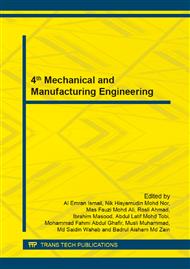p.1098
p.1103
p.1109
p.1114
p.1119
p.1127
p.1133
p.1138
p.1144
Study on Temperature, Force and Specific Energy of AISI 1020 under MQL Grinding Process
Abstract:
Grinding is one of the most difficult processes in machining operations. Normally, the flood coolant method was used as a cooling agent in the grinding process. The most common defects using flood coolant are higher grinding friction, higher heat generation, and thermal damage. Therefore, the minimum quality lubricant (MQL) was introduced to minimize the defects. The main objective of this project is to compare the performance of MQL and flood coolant techniques in terms of grinding temperature, grinding force and specific energy. Three levels of cutting speeds, three levels of feed rate and depth of cut are adopted in the evaluation. The experiments were conducted on a thin plate of mild steel AISI 1020. The result shows that the MQL technique was effectively supplied to the grinding contact zone. This research revealed that the MQL technique exhibited an advantages on the surface temperature compared to the flood coolant.
Info:
Periodical:
Pages:
1119-1123
Citation:
Online since:
December 2013
Authors:
Keywords:
Price:
Сopyright:
© 2014 Trans Tech Publications Ltd. All Rights Reserved
Share:
Citation:


